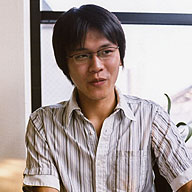An Interview with Watanabe Takashi
I Wanted to Affirm Changing Time
Q: Hara, the producer, introduced you to the student play Change that was the setting for this piece.
WT: At first I resisted. But he argued against me, saying “You need to get to know a lot of different people and be able to be convincing while you’re still young.” It was a kind of agitation, but I jumped into it feeling “Okay, why not give it a try.”
Q: Did your perspective change through meeting Nagasumi Ami, the lead person?
WT: That reflected back to me as I watched Ami. When I tried understanding someone else, it was essential that I “return to myself.” She dropped out of high school at the end of her first year. I didn’t drop out of school. Dropping out also requires courage and effort. Naturally there’s other people’s opinions, and probably fighting with your parents. I made the choice of doing a good job at being normal so there wouldn’t be any trouble. Maybe there’s the strength of being able to say “I don’t want to go, and I’m not going.” I began thinking it could be a very honest sensibility.

Q: You have yourself appear during the piece, but why was that?
WT: At first my intention was not to show any of the people shooting the piece. But then I started thinking “Okay, so why am I shooting this?” and that maybe there’s no meaning if you can’t see the faces of the people making the piece. Also, the people who appeared are telling us things that give them absolutely no benefit, like “I stopped going to school” or “I had anorexia.” So I thought that I needed to talk about myself too. At the time I was unemployed, and I wasn’t in a very good situation. When I thought about the reason, the point I ended up with was my family . . . And there were also the producer’s comments. “Don’t try and make things look good just with pictures,” “Don’t be stingy.” And so I spent about eight months on the editing (laughs).
Q: At the beginning there’s narration saying “I want to see change through to the end,” and the piece ends with the line “Don’t push me.” What is change? Also, the last line, which is also the title, is really interesting.
WT: At first the ending was “I want to do work that involves lots of interaction with people.” I tried telling the story of a confused girl who found her voice through the experience of theater. But that change seemed cheap too. Honestly, it’s like “can you really stand dramatic change like that?” I think it’s important to have time to germinate. I think there’s no way things happen like “I did theater. I changed,” and I ventured to cut it. I wanted to show that “more than making things go smoothly, you need to stubbornly find opportunities to understand yourself.” More than change itself, I wanted to affirm changing time. Shooting this piece, I stopped comparing myself with other people. Society demands that you act your age. The standard for acting your age is something that you decide for yourself. Pretending to act your age without knowing yourself is like leaving your emotions behind. You’re inviting regret if you move ahead without being convinced yourself.
Q: Do you have any thoughts about people watching the piece?
WT: I’d like people to get closer to themselves as they watch this film.
Q: If you have anything in particular you’d like to say, please go ahead.
WT: Before shooting this piece I felt like I wanted other people to get to know me well, but now it’s more like I want to get to know myself.
(Compiled by Tokumoto Yoko)
Interviewer: Tokumoto Yoko
Photography: Kato Takanobu / Video: Kato Takanobu / 2003-09-28 / in Tokyo
